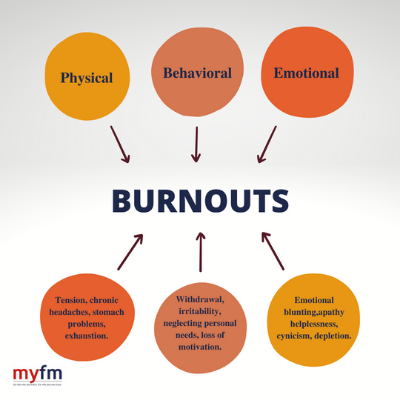Burnout: Stop Fighting it Start Unpacking it
The pandemic we witnessed started as a whirlwind before evolving into a prolonged storm. And these last two years elevated the importance of self-care to the forefront of businesses and employee health. Burnout impacts all - it’s pervasive and in full force around us.
Whether you have started a new role as an expert consultant or are simply self-employed, burnout will set in at some point.
The World Health Organisation deemed burnout an occupational phenomenon- chronic workplace stress that companies sometimes struggle to manage successfully. From feelings of energy depletion or exhaustion to reduced professional efficacy, reading the signs and knowing when to limit and stop will always have one coming back stronger and better.
Burnout is more than a syndrome; it’s cultural
It’s important to think about our culture as a society and the role it plays. Apart from burnout being categorised as a syndrome caused by organisational systems, systemic issues contribute to burnout.
From the organisational lens, there might be good policies for annual leave or incentives for the workload. However, if early attention is not paid to the patterns of systemic workload pressures, chances are this is when people might experience more burnout.
Causes of Stress
From a cultural perspective, the societal expectations around performance and achievement are an endless vicious circle. Working long hours as a badge of honour and the pressure we might have experienced to perform from that can be damaging in the long run and may result in depletion of mental well being. It’s essential to understand the triggers and start “Unpacking Burnout” instead of fighting it.
Watch our short video below for a quick overview, or alternatively carry on reading!
Categories of Burnout
Watching Out for Burnout Warning Signs
When real-life burnout hits, there are so many adverse side effects to it—reading the signs and knowing when to limit and stop will always have one picking up stronger and better.
Burnouts are mostly divided into the below categories.
The above is all from the lens of an individual perspective. Not to forget, burnout ripples soon reach the workplace.
“At an organisational level, burnout is closely linked to productivity, reduced professional efficacy and lower job satisfaction.”
We all have the power to stop burnout
If you’re feeling burnt out, there are things you can do to ease the symptoms and start feeling better. Once you know what’s causing it, you can take steps to address the issue. Most therapists (s) have outlined a few strategies that work and to try them out to ease burnout.
1. Evaluating your current situation
The first step is to take action back and evaluate your current situation. Are you feeling overwhelmed because you have too much on your plate? Or are there specific tasks or projects that are causing all the stress? Once you know the underlying cause, you can then address it. How much time are you spending on a specific task over the day? How long do you take for lunch? And do you eat away from your desk? Have you accounted for time to go on a midday walk? Ask yourself these questions.
2. Set boundaries
Whether it’s work or personal, one way to minimise burnout is to establish healthy boundaries. It could mean saying no to overtime, taking regular breaks throughout the day, or avoiding work-related conversations after hours. For example, on the personal front, it could be politely saying a “No” to a prolonged late dine out conversation or simply not succumbing to overanalysing things and overworking your brain. It’s always best to go with the flow, be in the present moment, and not dwell much on what the future holds. It’s essential to be proactive about setting these boundaries so you don’t become overworked and stressed.
3. Self-care
Ensure you attend to the foundations and prioritise – getting enough sleep, looking at your diet, drinking enough water, exercising, and limiting alcohol. Do more of what makes you happy. Learn to Reset - perhaps if you are into breathing exercises, meditation or yoga. Whatever helps you stop for a moment and reset, do it periodically. Don’t wait until the weekend, until you have a headache, or until you’re fully burnt out.
4. Prioritising “You.”
Take out time for yourself and unwind. Having a breather after an intense meeting or lengthy screen time can make a considerable difference and help you think more clearly and strategically. Try taking small breaks throughout the day, like going for a walk or allocating a few minutes to yourself. Downtime is essential to pause and reflect. By putting aside this precious time, you can benefit greatly and be in a better position to handle any situational challenges thrown at you with ease.
5. Understanding the sphere of control
We must understand that attending to work-life balance, using up holiday allowance, leaving work on time when we can, having boundaries around checking work emails, knowing when to delegate, and asking for help are essential steps to promote mental wellbeing. Having clarity on these spheres of control will help us make conscious choices and focus our energies on the things that we have the power to welcome and use to our benefit.
From Hierarchical Perspective:
Delegation is not laziness – It doesn’t mean neglecting responsibility or being lazy. Knowing when to delegate is a skill a good manager already has, whether in a permanent or interim role. Giving the right people (that you trust) the right tasks to get the job done in an assigned time frame relieves you from workload burnout and can help you channel your time more constructively. Want us to alleviate some of the pressure for you? Learn how we can help HERE.
Burnout is prevalent and caused by many different things. Embracing it, identifying the causes, and making small changes in your life will help you feel better and handle any challenges effectively.




